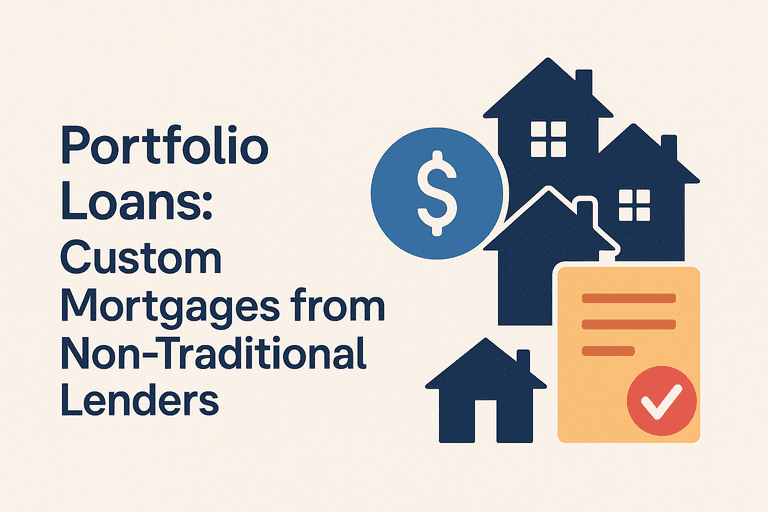For homebuyers who don’t fit the typical lending mold, traditional mortgages can be limiting. Standard loan guidelines may not accommodate unique financial situations, investment properties, or multiple income streams. This is where portfolio loans come into play. Offering flexibility and customization, these non-conforming mortgages held by lenders directly provide a tailored financing solution for diverse homebuyers.
What Is a Portfolio Loan?
A portfolio loan is a mortgage that a bank or lender keeps on its own books instead of selling on the secondary market. Unlike conventional loans that must meet strict Fannie Mae or Freddie Mac guidelines, portfolio loans allow lenders to create custom terms for borrowers. Because the lender assumes the risk directly, borrowers may qualify under more flexible criteria.
Portfolio loans are also known as lender-held loans because the issuing bank retains ownership rather than securitizing it.
Key Features of Portfolio Loans
Flexible Underwriting – Lenders can consider alternative income documentation, irregular employment, or unique credit histories.
Customizable Terms – Interest rates, repayment schedules, and down payment requirements can be tailored.
Non-Conforming Mortgage – Portfolio loans often don’t conform to standard loan limits or guidelines, making them ideal for jumbo mortgages or specialized properties.
Direct Relationship with Lender – Borrowers can negotiate terms directly, potentially gaining more favorable conditions.
Advantages of Portfolio Loans
Portfolio loans can offer distinct benefits compared to conventional financing:
1. Approval Flexibility
Lenders have discretion to approve borrowers who may be self-employed, have fluctuating income, or possess unique financial circumstances.
2. Tailored Loan Structures
Terms can include customized repayment schedules, adjustable-rate options, or interest-only periods, aligning with the borrower’s financial goals.
3. Higher Loan Limits
Because they are non-conforming mortgages, portfolio loans can exceed standard Fannie Mae and Freddie Mac limits, which is ideal for high-value properties.
4. Faster Decisions
Since the lender manages the loan directly, underwriting and approval can be faster and more responsive than traditional loans requiring secondary market sale.
Risks and Considerations
While portfolio loans offer flexibility, there are some potential downsides:
Higher Interest Rates – Custom loans may carry slightly higher rates than conventional mortgages due to lender risk.
Down Payment Requirements – Some lenders may require larger down payments to offset the risk.
Limited Resale Options – Selling or refinancing a portfolio loan may be more complex since it’s held privately by the lender.
Lender-Dependent Terms – Approval criteria, interest rates, and loan terms vary by lender, requiring careful comparison.
Who Should Consider a Portfolio Loan?
Portfolio loans are ideal for:
Self-Employed Homebuyers – Individuals with variable or non-traditional income streams.
Real Estate Investors – Those purchasing multiple properties or investment portfolios.
High-Value Property Buyers – Those needing loans above conforming limits.
Borrowers with Credit Challenges – Individuals with past credit issues who still have strong repayment potential.
Tips for Securing a Portfolio Loan
Research Lenders – Not all banks offer portfolio loans; look for lenders who specialize in non-conforming mortgages.
Prepare Detailed Financial Documentation – Lenders may request tax returns, profit-and-loss statements, or asset verification.
Negotiate Terms Directly – Take advantage of the direct lender relationship to customize interest rates, repayment schedules, or fees.
Understand Long-Term Implications – Consider future refinancing options, property resale, and potential rate changes.
Portfolio Loans vs. Conventional Mortgages
| Feature | Portfolio Loan | Conventional Mortgage |
|---|---|---|
| Guideline Flexibility | High – lender discretion | Low – must meet Fannie/Freddie rules |
| Loan Limits | Often exceeds conforming limits | Must meet conforming limits |
| Underwriting Speed | Faster with direct lender | Standard processing |
| Terms Customization | High | Limited |
| Interest Rates | Slightly higher | Generally lower |
Conclusion
A portfolio loan is an excellent option for homebuyers who need flexibility beyond standard mortgage guidelines. Whether you’re a self-employed buyer, real estate investor, or seeking a non-conforming mortgage, a lender-held loan can provide tailored terms, direct negotiation, and higher borrowing limits. However, borrowers should carefully weigh interest rates, repayment structure, and long-term strategy to ensure a successful financing experience.
For calculators, loan comparisons, and more in-depth guidance, visit CalculatingAMortgageLoan.com.
Sources:
